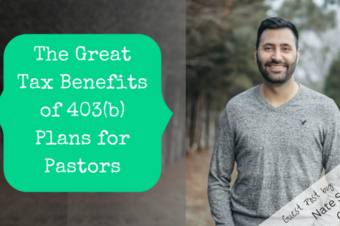
If you’re a pastor, hopefully you’ve been told that you are subject to dual status taxation. If not, I’m really glad you’ve found this post!
What Is Dual Status Taxation?
Dual status taxation simply means that you are taxed two different ways in the same tax year. My husband was subject to dual status taxation back in 2011 when he became a US citizen. For the first part of the year, he was taxed as a resident alien and the second part of the year he was taxed as a citizen. Dual status just means that he had two different statuses during the year.
My husband was only subject to dual status taxation for one year, but pastors aren’t so lucky. You are subject to permanent dual status taxation. That means that every single year you are going to be taxed in two different ways. It isn’t something you can avoid, it’s simply something that comes along with being a pastor.
Why Are Pastors Subject To Dual Status Taxation?
I wish I could tell you why pastors are always subject to dual status taxation. Unfortunately, as with many government policies and procedures, it’s hard to find the why behind it. Though I can’t tell you why things are the way they are, I can at least tell you how it all works.
For federal income tax purposes, pastors are considered common-law employees and taxed as employees. For Social Security and Medicare taxes, also called payroll taxes, pastors are taxed as if they were self-employed. Of course, if you’ve opted out of Social Security, you aren’t subject to these taxes at all. So, in review:
Federal Income Tax: Pastor = Employee
Social Security/Medicare Tax: Pastor = Self-Employed
What Does Dual Status Taxation Look Like For Pastors?
What does it mean to be taxed as an employee or as self-employed?
For your federal income taxes, you get Form W-2 from your church and you enter the wages they paid you on line 1 of Form 1040. Just like any other employee of a company would do. You don’t have to fill out Schedule C like self-employed people (unless you have income paid to you by someone other than the church, such as fees paid directly to you for performing weddings).
Even though you feel and act like an employee and you file Form 1040 like an employee, the IRS does not consider you one for your payroll taxes. Employees only have to pay 6.2% of their wages (on up to $132,900 of wages in 2019) for Social Security and 1.45% of their wages for Medicare (0.9% more when your wages exceed $200,000). That’s what employees pay and their employer matches it for a total of 15.3% of wages paid to the government.
As a pastor, the double portion falls on you. But you don’t want it the way Elisha did. You get to file as a self-employed person and pay BOTH the employee and employer portion of your payroll taxes.
Why? Boy, do I wish I knew! If you know, please tell me!
What I do know is that pastors have to pay the full 15.3% and it’s actually against the law for churches to try to pay payroll taxes for pastors. Strange, huh?
So, even though your Form 1040 looks like you’re an employee, you will have to fill out Schedule SE to pay your Social Security and Medicare taxes as a self-employed person. The only good thing is that half of those taxes are deductible. (You’ll have to file the new Schedule 1 in order to do so.)
How Does The Housing Allowance Fit In?
One thing that you need to be aware of in all of this is your clergy housing allowance. It, as well, is treated differently for the different taxes.
What the housing allowance is is an exemption from federal income taxation. That means you don’t have to pay taxes on that amount and it won’t appear on your form 1040. So, for federal income tax purposes, the housing allowance is tax-free free money.
Sadly, the housing allowance is not exempt from Social Security and Medicare taxation. On Schedule SE, where you calculate your self-employment taxes, you will have to add your housing allowance back into the wages shown on your W-2 to arrive at your total taxable income.
This doesn’t just apply to the cash or rental housing allowance, either. It applies to the parsonage allowance as well. Even though you never saw any actual money, the fair rental value of your church-provided home must be included in your income on Schedule SE.
So, you have to pay 15.3% of all of the cash you received, even if it was used for housing expenses. And, if you live in a parsonage, your bill will be even more than 15.3% of the cash that you have received since the value of your home is calculated as if you had received it in cash. In summary:
Federal Income Tax: Housing Allowance = Tax-Free
Social Security/Medicare Tax: Housing Allowance = Taxable
And that is what it means for pastors to be subject to dual status taxation. Click here for more articles that will help you file your taxes this year.




15 Responses
Jon
February 8, 2023Hi Amy,
Thank you for this info! Quick question. Do pastors need to pay SECA on their distributions from a 403b9 that is designated as housing allowance?
Thank you!
Amy
April 9, 2023No. There is no SECA due on any 403(b)(9) distributions, whether or not it is housing allowance.
Bryan
March 7, 2024I am curious if a pastor actually saves money using the housing allowance while also paying the self-employment tax? It seems to me that you save money on income tax but will owe even more on self-employment that doesn’t offset. Most likely will have to pay more than you normally would staying a director at a church instead of pastor. Is this true?
Amy
March 15, 2024Bryan, that is a really good question that doesn’t have a simple answer. It really comes down to each person’s individual tax situation. For example, the higher the tax bracket you are in, the more valuable the housing allowance is. Also, the higher your state income taxes are, the more valuable it is. In addition, if you contribute to a church-sponsored retirement plan, you don’t pay self-employment taxes on that money and can also claim it as a housing allowance in retirement, which are other benefits that would have to be factored in.
Michael Watkins
March 19, 2025Hello
I am a pastor of a Baptist Church in Florida. I have a question about the house that was purchased in the name of the church. But with my down payment and with my equity increasing quite a lot, I just sold the house and the cash is in the Church account. What would be the best way of drawing that money out and not having to pay a large amount of tax. We are talking about $100,000. That is actually mine but it’s in the Church account and they want to transfer it into my name.
Thank you
Amy
April 13, 2025I would recommend you consult a CPA, since church accounting is beyond my expertise. You should be able to find one here: https://pastorswallet.com/clergy-tax-preparers/